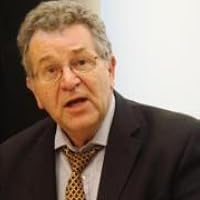7,433 books
—
25,614 voters
Patrick Link
https://www.goodreads.com/plink
If the US could be that accommodating then to the wishes of a country that had produced one of the most loathsome regimes in history but had lost its capacity to inflict injury, it is difficult to understand why Washington now has elected
...more


“Several hundred thousand people were moved, some by force, into these strategic hamlets.”
― The Rhodesian War: A Military History
― The Rhodesian War: A Military History

“Collective fines were imposed on the affected areas. Tribesmen were hit where it hurt most: their cattle were impounded. In February 1973, all facilities–shops, clinics, schools, churches, businesses and mills–were shut down in the Chiweshe TTL. Other areas were also ‘closed’ while the Rhodesian army swept them. ‘Inform on the guerrillas or your schools and shops will stay shut’ was the message. Although intelligence began to improve, these collective measures embittered the peasant farmers. Even”
― The Rhodesian War: A Military History
― The Rhodesian War: A Military History

“A Psychological Action section was formed, but it was mesmerized by gimmicks and produced flashy, poorly informed propaganda. Official”
― The Rhodesian War: A Military History
― The Rhodesian War: A Military History
“The fact that the United States did not invade Cuba has given Kennedy’s pledge more weight than it deserves. The documents that have been declassified suggest that the prospect of an invasion was “shunned”33 because of its potential cost—the toll in American lives, the risk of a confrontation with the Soviet Union spiraling into global war, the negative impact on the allies and on public opinion worldwide—rather than scruples pursuant to the purported noninvasion pledge. Furthermore, Cuba would soon be overshadowed by Vietnam.”
― Piero Gleijeses' International History of the Cold War in Southern Africa, Omnibus E-Book: Includes Conflicting Missions and Visions of Freedom
― Piero Gleijeses' International History of the Cold War in Southern Africa, Omnibus E-Book: Includes Conflicting Missions and Visions of Freedom
“I stressed to Neto that the way we treat the population is key to gaining their support. . . . I stressed how the thuggish behavior of the FNLA (robberies, assaults, murders, rapes, unbelievable savagery) engenders widespread hatred even among people who are not politicized. Later, there will be [time for] propaganda, political education, . . . but simply treating people well . . . can garner the massive support of the population.50”
― Piero Gleijeses' International History of the Cold War in Southern Africa, Omnibus E-Book: Includes Conflicting Missions and Visions of Freedom
― Piero Gleijeses' International History of the Cold War in Southern Africa, Omnibus E-Book: Includes Conflicting Missions and Visions of Freedom
 Goodreads Librarians Group
— 309079 members
— last activity 1 minute ago
Goodreads Librarians Group
— 309079 members
— last activity 1 minute ago
Goodreads Librarians are volunteers who help ensure the accuracy of information about books and authors in the Goodreads' catalog. The Goodreads Libra ...more
 Mallet Assembly
— 37 members
— last activity Jan 06, 2020 02:11PM
Mallet Assembly
— 37 members
— last activity Jan 06, 2020 02:11PM
Mallet Assembly at the Universtiy of Alabama, plus alumni and friends.
Patrick’s 2025 Year in Books
Take a look at Patrick’s Year in Books, including some fun facts about their reading.
More friends…
Polls voted on by Patrick
Lists liked by Patrick




























































